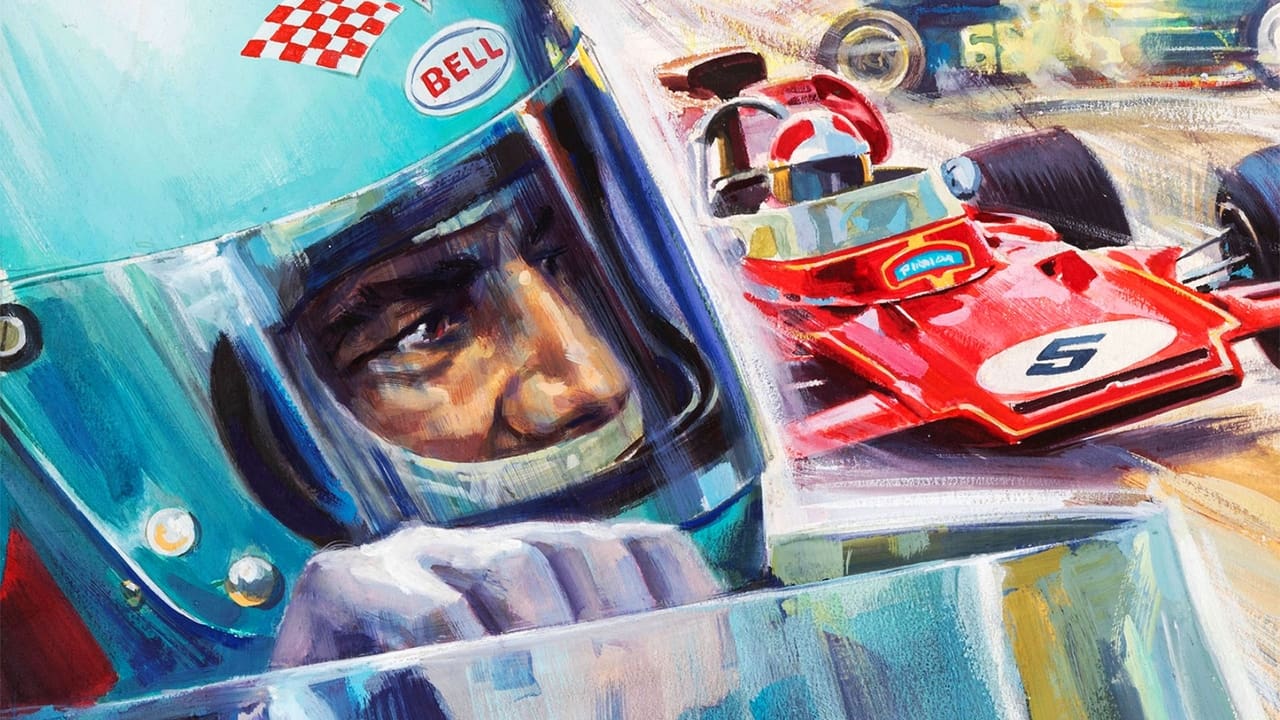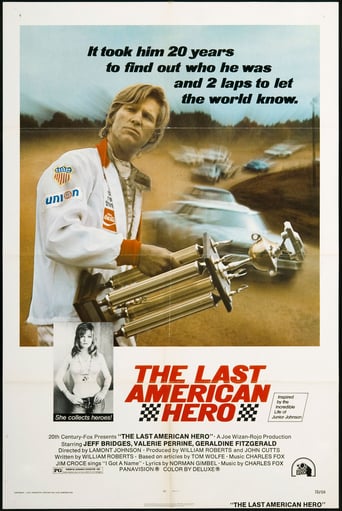RipDelight
This is a tender, generous movie that likes its characters and presents them as real people, full of flaws and strengths.
Lollivan
It's the kind of movie you'll want to see a second time with someone who hasn't seen it yet, to remember what it was like to watch it for the first time.
Hayleigh Joseph
This is ultimately a movie about the very bad things that can happen when we don't address our unease, when we just try to brush it off, whether that's to fit in or to preserve our self-image.
Payno
I think this is a new genre that they're all sort of working their way through it and haven't got all the kinks worked out yet but it's a genre that works for me.
SnoopyStyle
Elroy Jackson Junior (Jeff Bridges) drives fast along the back roads of North Carolina delivering moonshine whiskey for his father (Art Lund). Their still explodes and father is sent to jail. Junior starts racing dirt tracks and demolition derby for small time operator Hackel (Ned Beatty) to raise money for his father's legal defense. He builds his own cars. His brother Wayne (Gary Busey) tries to get him a garage mechanic job and his mother is worried about safety. He meets sweet Georgia peach Marge (Valerie Perrine) working one of the races. The races get bigger and bigger.This has a great sense of the backwoods world of racing. Bridges is terrific as a man waiting to explode. It's got good car sequences. It also has the great Jim Croce song "I Got a Name". The story needs a bit more drama. Junior needs to overcome something insurmountable. It all feels rather predetermined but it's compelling nevertheless.
edwagreen
We all know what a hero is. What makes the Jeff Bridges character a hero here?Forced to go into car racing to help his jailed father, Bridges emerges as a race car winner. This tale could have been told in about half the time. The racing scenes are what you would expect in a typical Paul Newman film on this subject.What was Geraldine Fitzgerald thinking of when she made this film? Her British accent comes through her southern drawl and besides, she is given so little to do here. Ditto here for Gary Busey. He smiles here and that's about it for him.The one poignant scene where the father tells the sons that he wants something better for them other than prison is wasted. We never really know why the father was jailed for selling the whiskey. Was it moonshine?
Woodyanders
Jeff Bridges gives a typically splendid, boyishly affable and charming performance as Elroy "Bobcat" Jackson, Jr., a cocky, rebellious, recalcitrant, trouble-making hot dog hillbilly moonshine runner who becomes a professional stock car racer and demolition derby driver in order to raise enough cash to get his dear ol' crusty, mule-headed pappy (a marvelously gruff Art Lund) out of jail. Assisted by his loyal, but hot-tempered brother Wayne (the always fine Gary Busey) and against the wishes of his staunch, worrisome mother (a wonderfully indomitable Geraldine Page), Elroy aspires to achieve champion driver status in the ferociously competitive world of professional stock car racing, thus having both his stubborn pride and homespun integrity put to the ultimate test in the process.Inspired by a Tom Wolfe "Esquire" article on flamboyant real life racing legend Junior Johnson (who worked as a consultant and technical adviser on the film), this spunky little number offers both a glorious celebration and a compelling exploration of rugged individualism and that great quintessentially all-American desire to be somebody in life. Lamont Johnson's sharply perceptive direction, ably complimented by George Silano's lively, breathtaking cinematography and Charles Fox's twangy country score (Jim Croce's blustery "I Got A Name" makes for a fantastic life-affirming theme song), astutely pegs the rowdy, boisterous, danger-ridden, and testosterone-soaked macho atmosphere of the racetrack milieu (the race scenes are suitably wild and thrilling) and delivers a rich, flavorsome evocation of humble, dirt poor, strongly family-oriented Southern backwoods America. William Roberts' acidulous script affects a cynically barbed and askew point of view in its penetrating portrait of America's love for do your own thing outlaw nonconformists and how winning inevitably comes with substantial unavoidable attachments. The stand-out supporting cast includes Valerie Perrine as a sweetheart racetrack groupie, William Smith as a formidable rival driver, Ed Lauter as a sleazy corporate sponsor, Ned Beatty as an oily demolition derby manager, and Lane Smith as an antsy, burnt-out driver. A terrifically tart'n'smart slice of pure Americana story of the guts and stamina it takes to actively pursue making your dreams come true.
jeffhill1
Why is it that the only people commenting on "Last American Hero" do not live in America? Even when the film was first released in 1973, the panoramic view of Jeff Bridges' fast moving car swirling up the autumn leaves of the American wooded hills accented by Jim Croce's engrossing song of "I've Got a Name" gave "Last American Hero" an overwhelming nostalgic and "American" feel, at least to those of us who saw it in theaters overseas. And for both sheer physical appearance and charisma of the human personification of "American", nothing could beat Jeff Bridges and Valerie Perrine, especially when they stood out against the secondary American characters played by Gary Busey, Ned Beatty, and William Smith. For me one of the most inspiring piece of movie banter of all time is presented in the film when Jeff Bridges as Elroy meets his father in jail and in reference to Elroy's somewhat whiny note of "What are we going to do now?", the father angrily yells at him, "What's your name?!" "Elroy Jackson Junior!" Jeff Bridges yells back. "You'll find a way," the father responds in a confident, reassuring, American tone.

